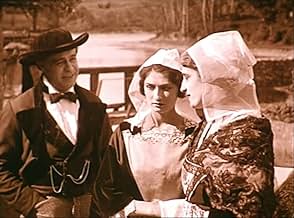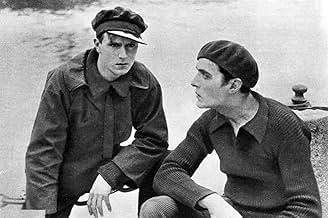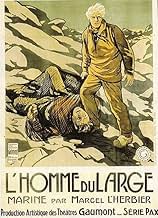Aggiungi una trama nella tua linguaNolff, a tough Breton fisherman is happy: his wife has just given birth to a son, Michel. His only wish is to make him a fisherman like him. But when he becomes a man, Michel becomes a good-... Leggi tuttoNolff, a tough Breton fisherman is happy: his wife has just given birth to a son, Michel. His only wish is to make him a fisherman like him. But when he becomes a man, Michel becomes a good-for-nothing who spends his time in taverns with his evil genius friend Gwenn la Taupe. The... Leggi tuttoNolff, a tough Breton fisherman is happy: his wife has just given birth to a son, Michel. His only wish is to make him a fisherman like him. But when he becomes a man, Michel becomes a good-for-nothing who spends his time in taverns with his evil genius friend Gwenn la Taupe. The sea will be his judge.
- Regia
- Sceneggiatura
- Star
- Guenn la Taupe - le mauvais génie de Michel
- (as Charles-Boyer)
- La mère de Michel et de Djenna, à la santé fragile
- (as Claire Prelia)
- Le protecteur
- (as Philippe Heriat)
- Michel - le fils d'un honnête pêcheur qui tourne mal
- (as Jaque-Catelain)
- Un des copains
- (non citato nei titoli originali)
- Un des copains
- (non citato nei titoli originali)
- Un pêcheur
- (non citato nei titoli originali)
- La tenancière
- (non citato nei titoli originali)
- La lesbienne
- (non citato nei titoli originali)
Recensioni in evidenza
"l"Homme du large " is a strong drama of a briton sailor (Roger Karl, playing natural) who hates life in town and lives in front of the sea, loving ocean and boat life. And he's so happy to have a son and learn him his passion. But his son (Jaque Catelin, who worked a lot with the director) becomes a hoodlum by going out with nasty friends (Charles Boyer and Claude Autant-Lara, who also worked on settings, costumes and direction), even stealing family savings. The father's reaction is awsome.
Shot in Brittany around Penmarc'h (menhirs and calvaire), settings don't overload on briton symbols, just discretely shot (costumes, mother's bed,...).
I didn't find any notations in my usual encyclopedias, but it's a pure masterpiece shot by Marcel l'Herbier with his friends, who would become one of the greatest director of the 20's in France. And it reminded of movies by Dreyer or Murnau. The restored print is superb.
It's the story of four characters:The father (Nolff),the mother(she was not given a name),the brother (Michel)and the sister (Djenna).It takes place in Britanny among the menhirs (Carnac?) and in front of the sea.
Nolff presents the sea with his son: "here's your "promise" (old French word for "fiancée") he tells the baby .Nolff is very proud to have a boy and tells his wife "Now I will take care of him,you'll keep your daughter." Unfortunately,as years pass by,the girl becomes a virtuous good woman whereas the spoiled child turns into a good-for-nothing,always hanging around in the town -which epitomizes evil- .Nolff wanted his son to become a fisherman ,but all the boy wants is to have fun with his bad pals in the low dive.Always short of the readies,his father is a cash cow to him.
A movie of redemption,where religion and mysticism come to the fore.Brittany is one of the French regions where religious fervor is the most intense.Faith in Virgin Mary for the women.On the other hand,and although he goes to church for Easter,the father's religion has pagan accents with old testament accents.His "judgement of the sea' has got something of Abraham.But the Nile was Mosis's salvation,and it's possible that the father hopes against hope that something will happen.
Admirable scenes: -The boy in the low dive while his father is sailing and his mother is dying.Editing is stunning.
-The cross which appears on the sea.
-The shadows of the brother and the sister who meet again on the beach .
-The father tearing off his daughter's nun's clothes when his prodigal son has come home.
But it's the whole movie which is captivating.It has the strength of Victor Hugo's epic poem "Les Pauvres Gens" .
So what we have here is a conflict between Nolff, who seeks the purification of isolation within a sea that he treats as a place of worship, and Michel, who is interested only in the immediate pleasure of the palaces of sin that come to life in the city at night, decadent places where homosexuality and violence are commonplace. In spite of Nolff's blind affection for his only son, eventually there is a conflict which leads to an even more hermetic life for Nolff, a monastery for his saintly daughter Djenna, and redemption through suffering for Michel.
Marcel L'Herbier is known as one of the major French directors of the silent era as well as one of the pioneers of cinematic Impressionism. As this is quite early in his career, there are relatively few formal innovations in Man of the Sea, although his use of landscape and environment to suggest character traits is a relatively new technique for the time that is used extensively. Further, there are a few really memorable visual flourishes here, such as the cross that appears in the sea to suggest Nolff's association of it with the divine. This is a promising film which likely bodes good things to come as I continue my chronological exploration of L'Herbier's work.
L'Herbier's writing and direction are equally keen in shaping the story of human drama: a proud seaman, a wayward son, difficulties at home and in the nearby village, acts of desperation. There are timeless themes on hand that even modern viewers will recognize - questions of parenting styles, the laxity and lack of accountability that are afforded to men and boys even with the worst of behavior; the disappointment, frustration, and hurt of frayed family dynamics. It's a fine credit to the cast that they very ably bring the complex emotions and nuances to life with their acting, making the narrative all the more vivid. That realization is bolstered by the robust, flavorful, and varied tinting, and by the capable editing, and is additionally lent power by excellent hair, makeup, and costume design that further the somber airs about the proceedings. There's splendid detail in the sets, too, helping the feature to feel as real as it could.
Well done as the movie is, there's no especial stroke of brilliance here, and nothing that immediately leaps out to grab one's attention. However, nor are there any especial flaws that come to mind - it may not be wholly remarkably in the annals of cinema, but 'L'homme du large' is just about as solid as one can get before reaching the point of effusive praise. Such as it is I don't suppose this will do anything to change the minds of modern viewers who have a hard time engaging with older fare, yet anyone who is a fan of the classics will find much to love here. There's no rule that says every title needs to be a lightning bolt to be worth recognition and remembrance, and this is all that it needs to be with commendable craftsmanship across the board to tell a compelling, unexpectedly dark story and keep us engaged. Don't feel the need to go out of your way for 'L'homme du large,' but if you like silent films and have the chance to check it out, this is well worth 85 minutes of one's time.
First seen torturing a crab, the prodigal son eventually learns to treat ocean life with the respect it properly deserves.
Lo sapevi?
- QuizCharles Boyer's debut.
- ConnessioniEdited into Spisok korabley (2008)
I più visti
Dettagli
- Tempo di esecuzione1 ora 26 minuti
- Colore
- Mix di suoni
- Proporzioni
- 1.33 : 1
Contribuisci a questa pagina
























